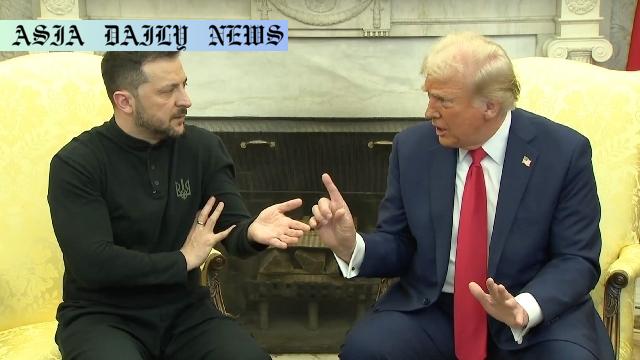Zelenskyy: Russia criticizes the Ukrainian President’s US visit as a major failure, citing perceived irresponsibility and ongoing conflicts.

Russia Criticizes Zelenskyy’s US Visit
Ukrainian President Volodymyr Zelenskyy’s recent visit to Washington for talks with US President Donald Trump has been met with harsh criticism by Russia, sparking heated discussions in geopolitical circles. Russian Foreign Ministry spokesperson Maria Zakharova stated that the visit was a ‘complete political and diplomatic failure.’ Russia’s remarks showcase its dissatisfaction with Zelenskyy’s diplomatic moves and its larger strategic objectives in the ongoing Ukraine conflict.
Accusations of Irresponsibility and Warmongering
Maria Zakharova further accused Zelenskyy of being an irresponsible figure who endangers global stability. She claimed his ‘outrageous’ behavior in Washington reaffirmed his role as a threat to the international community. Moreover, Zakharova implied that Zelenskyy’s stance propagates continued conflict rather than fostering avenues for peace. This underscores longstanding tensions between the two nations, with Russia accusing Ukraine’s leadership of refusing to engage in dialogue that would halt military escalation.
Russia’s Strategic Narrative: Territorial and Political Objectives
In her statement, Zakharova also called on the global community to acknowledge Russia’s control over four Ukrainian territories that Moscow currently dominates. These appeals align with Russia’s broader strategic goals, including ‘demilitarization’ and ‘denazification’ of Ukraine—terms frequently used by the Kremlin to justify its military actions within Ukrainian borders. This rhetoric highlights Russia’s attempts to reframe its aggression as necessary for regional stability.
The Implications for Global Diplomacy
Zelenskyy’s visit and Russia’s subsequent remarks emphasize the wider geopolitical impact of the ongoing war in Ukraine. Western nations, particularly the United States, have continued to support Ukraine against Russian aggression. This dynamic places immense pressure on Ukraine’s leadership to secure resources, support, and solidarity. Meanwhile, Moscow aims to leverage its position on the conflict to reshape international perceptions of the war and its consequences.
Commentary
Moscow’s Criticism: A Strategic Perspective
Russia’s severe critique of Zelenskyy’s US visit is not merely reflective of diplomatic dissatisfaction but serves as a calculated move to project its narrative on the international stage. By framing the visit as a ‘failure,’ Moscow seeks to undermine Ukraine’s alliances, particularly with powerful Western countries like the United States. This rhetoric plays into the larger information war surrounding the Ukraine crisis, where both sides aim to shape global opinion to their advantage.
Geopolitical Ramifications and the Role of Western Powers
The implications of this development extend beyond the immediate criticism of Zelenskyy himself. As Western nations continue to support Ukraine, Russia’s increasing frustration signals rising tensions. This has potential repercussions for global diplomatic efforts and the stability of Eastern Europe. Moscow’s appeal for international recognition of occupied territories further reshapes the dialogue to focus on territorial disputes, forcing the global community to respond either with support or opposition.
The Challenge of Balancing Peace and Conflict
Both Ukraine and Russia find themselves locked in a challenging scenario. Zelenskyy must navigate the double-edged sword of seeking support abroad while maintaining the trust and confidence of his own people. Conversely, Russia is attempting to validate its aggressive territorial claims as a defensive necessity. These competing narratives highlight the entrenched nature of the conflict, which shows no signs of resolution in the immediate future.


